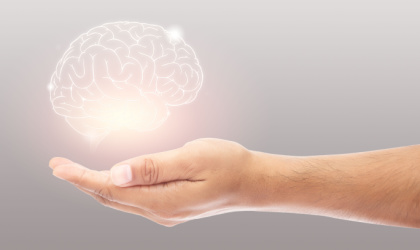
A subdivision of our peripheral nervous system, the autonomic nervous system oversees involuntary processes, like breathing and digestion. This system is always ticking away. It’s autonomic. And it works tirelessly to keep us alive.
What is the autonomic nervous system?
The autonomic nervous system is made up of three parts: the sympathetic, parasympathetic, and enteric nervous systems.
Sympathetic nervous system
The sympathetic nervous system controls what we commonly refer to as the ‘fight or flight’ response in the body. When faced with immediate danger, the sympathetic nervous system kicks into gear and prepares the body to fight or flee (2). It accelerates heart rate, dilates pupils, and stimulates sweat production. Think of it as your body’s in-built alarm system.
Parasympathetic nervous system
Contrastingly, the parasympathetic nervous system regulates the ‘rest and digest’ response (3). Once the stressor has passed, it reduces heart rate, slows breathing, and constricts pupils. The parasympathetic nervous system enables the body to recover and conserve energy.
The antagonistic relationship between the sympathetic and parasympathetic nervous systems helps maintain homeostasis in the body.
Enteric nervous system
The main function of the enteric nervous system is to digest food and absorb nutrients. It oversees your digestive muscles and enables them to contract and relax. It’s also known as the ‘second brain’, owing to the gut-brain axis.
Read more about the enteric nervous system here
How to calm an overactive sympathetic nervous system?
When an animal escapes from the pursuit of a predator, it will literally ‘shake off’ the stress and trauma. Animals do this to reset and rebalance their nervous system. However, in our fast-paced, ever-changing world, this isn’t always possible.
Whether it’s road rage, work deadlines, or a stressful school run, modern life is full of stressors that activate the sympathetic nervous system. And if we don’t complete the ‘stress cycle’ – as animals do – our body remains in fight or flight, which feels like we’re living in a constant mini-emergency.
The overactivity of the sympathetic nervous system disrupts the delicate balance of the autonomic nervous system, accelerating cortisol levels, adrenal glands, and hormonal balance, and, ultimately, ramping up stress in the body.
If we remain chronically stressed, it can affect all systems in the body, including respiratory, endocrine, cardiovascular, gastrointestinal, and reproductive. It can even lead to burnout.
Fortunately, there are many ways to calm an overactive sympathetic nervous system and return the autonomic nervous system to a state of balance and regeneration.
Diaphragmatic breathing
Slow, intentional belly breathing – which contracts the diaphragm on the inhale and relaxes on the exhale – activates the vagus nerve, one of the main nerves that run to the parasympathetic nervous system (4). As a result, conscious belly breathing can quickly relax and calm the body. Even one round of belly breathing can help reset the autonomic nervous system.
Yoga
Yoga has long been used to balance the nervous system. As with deep, conscious breathing, yoga-based practices stimulate the vagus nerve, which activates the parasympathetic nervous system and puts the body in a state of relaxation (5). A regular yoga practice can also help build emotional resilience, meaning the body’s fight or flight response won’t be as easily triggered when exposed to stress.
Massage
Regular massage has been shown to align the sympathetic and parasympathetic nervous systems (6). By awakening the parasympathetic nervous system, the brain releases feel-good hormones, like oxytocin and endorphins, serotonin and dopamine, which encourages the body to feel relaxed.
What vitamins help the autonomic nervous system?
Besides living in a way that balances your autonomic nervous system, you may also wish to include the following nutrients.
B vitamins
The family of B vitamins are involved in many different biochemical processes. In particular, vitamins B1, B3 (niacin), B6, B7 (biotin), and B12 contribute to the normal functioning of the nervous system. Alongside folate, these B vitamins also play a critical role in normal psychological function. Find them: Green leafy vegetables.
If you’re looking for additional support, we recommend our high-strength B-complex, Neuro-B. Designed with healthy nerves in mind, this all-in-one formula contains relevant amounts of vitamin B1 for the nervous system, vitamin B6 (as PSP) for normal red blood cell formation, and B12 for normal neurological and psychological formation.
Magnesium
An essential mineral involved in over 300 biochemical processes; magnesium contributes to the normal functioning of the nervous system. It also supports normal psychological function. Find it: Pumpkin seeds.
Vitamin D3
Vitamin D is vital for good health. Some experts believe low levels may affect the nervous system (7). Find it: Eggs yolks.
Adaptogenic herbs
Adaptogenic herbs, like ashwagandha, Siberian Ginseng, and Korean Ginseng, are often recommended by nutritionists as they can be a helpful part of a supplement regime. (8).
Palmitoylethanolamide
PEA is an endocannabinoid-like compound found in almost every cell, tissue, and fluid in the body. Naturally produced when cells are damaged or threatened, PEA is a well-researched alternative to CBD. It’s a popular choice to support overall emotional health and nervous system function.
Theanine
The amino acid found in tea, theanine, is a useful addition for those looking to support nervous system function and emotional health.
Turmeric
The active compound in turmeric, curcumin, has been celebrated for generations. Many people take it to support their overall health and wellbeing (9).
Want to learn more?
If you want to find out more about supporting your nervous system, please explore the rest of our dedicated health blog. Alternatively, please get in touch with our team of expert Nutrition Advisors, who are on hand to provide free, confidential advice via email, phone, and Live Chat.
References:
-
McCorry LK. (2007) Physiology of the autonomic nervous system. Am J Pharm Educ. 15;71(4): 78.
-
Dutfield, S. and Lanese, N. (2022) Fight or flight: The sympathetic nervous system, LiveScience. Available online: https://www.livescience.com/65446-sympathetic-nervous-system.html
-
Paul Rea et al. (2014) Introduction to the nervous system, Clinical Anatomy of the Cranial Nerves. Academic Press. Available online: https://www.sciencedirect.com/science/article/pii/B9780128008980000191
-
Paul Rea et al. (2014) Introduction to the nervous system, Clinical Anatomy of the Cranial Nerves. Academic Press. Available online: https://www.sciencedirect.com/science/article/pii/B9780128008980000191
-
Relaxation therapies. UCLA Health System.. Available online: https://www.uclahealth.org/medical-services/gastro/wellness/wellness-approaches/relaxation-therapies
-
Streeter CC, Gerbarg PL, Saper RB, Ciraulo DA, Brown RP. (2012) Effects of yoga on the autonomic nervous system, gamma-aminobutyric-acid, and allostasis in epilepsy, depression, and post-traumatic stress disorder. Med Hypotheses. 78(5):571-9.
-
Diego MA, Field T. (2009) Moderate pressure massage elicits a parasympathetic nervous system response. Int J Neurosci. 119(5):630-8.
-
Wrzosek M, ?ukaszkiewicz J, Wrzosek M, Jakubczyk A, Matsumoto H, Pi?tkiewicz P, Radziwo?-Zaleska M, Wojnar M, Nowicka G. (2013) Vitamin D and the central nervous system. Pharmacol Rep. 65(2):271-8.
-
Panossian A, Wikman G. (2010) Effects of Adaptogens on the Central Nervous System and the Molecular Mechanisms Associated with Their Stress-Protective Activity. Pharmaceuticals (Basel). 19;3(1):188-224.
-
Kulkarni SK, Dhir A. (2010) An overview of curcumin in neurological disorders. Indian J Pharm Sci. 72(2):149-54.
Related Posts

Olivia
Olivia Salter has always been an avid health nut. After graduating from the University of Bristol, she began working for a nutritional consultancy where she discovered her passion for all things wellness-related. There, she executed much of the company’s content marketing strategy and found her niche in health writing, publishing articles in Women’s Health, Mind Body Green, Thrive and Psychologies.
View More






